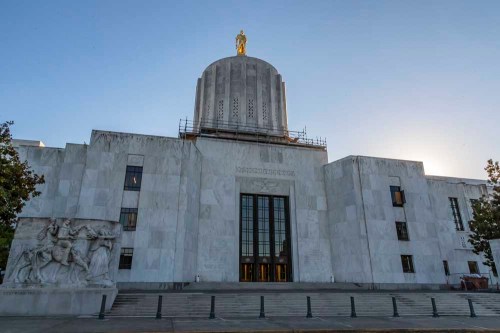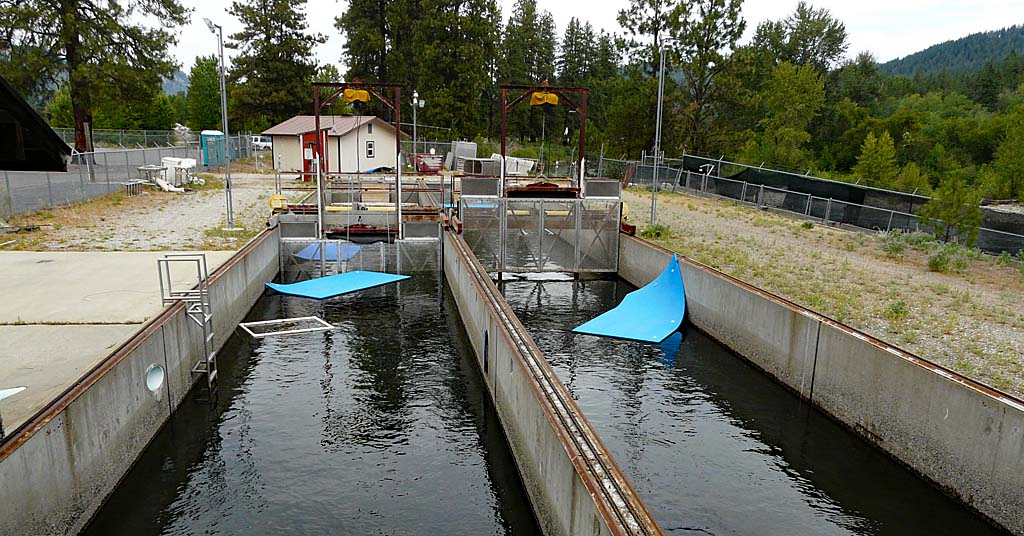Oregon Capitol to start bag searches, use of metal detectors
Published 2:00 pm Sunday, January 16, 2022

- The Oregon Capitol is enhancing security on Jan. 27, 2022, before the start of the new legislative session.
SALEM — Oregon will join 33 other states in requiring visitors, elected officials and staff to pass through metal detectors and submit to bag checks when they enter the Capitol.
The enhanced security in Salem will start Jan. 27. Senate President Peter Courtney and House Speaker Tina Kotek, the Legislature’s presiding officers, said in a statement it will be similar to the procedure for entry into court buildings. State employees staff trial courts, but Oregon’s 36 counties provide the courtrooms and maintain security.
Trending
The Legislature is responsible for management of the Capitol under a 1969 law. The secretary of state was the previous legal custodian of the Capitol and its grounds.
The enhanced security will apply at the two public entrances open and two other entrances for employees and others with special identification cards. The State Street entry, facing Willamette University to the south, and the main entry with its iconic revolving doors are closed because of construction.
The Capitol, the third in Oregon history, opened in October 1938.
The Capitol’s office wings, opened in 1977 and renovated in 2008, are undergoing seismic reinforcement as part of a larger building improvement project. The wings house offices for individual legislators.
The Capitol was reopened to the public on July 12, 2021, after the close of the regular session. It had been closed for 16 months after the onset of the coronavirus pandemic.
Firearms ban
Trending
The added security follows a recent law (Senate Bill 554) barring firearms, even those carried by people with concealed-handgun licenses, from the Capitol.
During the 2021 session, lawmakers barred firearms from the Capitol and the passenger terminal at Portland International Airport as part of broader legislation to require safe storage of firearms by their owners. Schools, community colleges and universities have the option to do so by action of their governing boards. Opponents failed to submit signatures for an attempt to refer the legislation to a statewide election, so the new law took effect Sept. 25. Signs are posted at the public entrances.
Lawmakers acted after anti-lockdown demonstrators, some of them armed, attempted to force their way into the Capitol during a special session on Dec. 21, 2020, when the Capitol still was closed to the public. Some of them got into a vestibule before police ejected them; police blocked their second attempt at a different entry later in the day.
Anti-lockdown, pro-Donald Trump demonstrators also appeared at the Capitol on Jan. 6, 2021 — the same day as the insurrection at the U.S. Capitol in Washington — but were confined to the Capitol Mall across from the Capitol. The Oregon Capitol was closed to all employees, and ground-level windows in the office wings and main building were covered with plywood. The boards were removed a couple of months later.
On June 10, 2021, the House expelled Rep. Mike Nearman, a four-term Republican from Polk County, after Capitol surveillance video showed he opened the vestibule door and allowed demonstrators to enter the building. He reentered through another door on the other side. A cellphone video surfaced later during which Nearman told a pre-session audience that if he received a text message, they might gain access to the Capitol. Once that video was disclosed, the 22 other Republicans joined all 37 Democrats in the 59-1 expulsion vote, the first since Oregon became a state in 1859.
Nearman pleaded guilty July 27 to one count of first-degree official misconduct, but expressed no regret for his action during his appearance in Marion County Circuit Court. The district attorney dropped a second charge of criminal trespass.
Relatively open
Oregon was one of the few remaining states with relatively open access to its capitol building, according to the National Conference of State Legislatures.
The Legislative Administration Committee, the joint House-Senate panel that oversees the building and legislative staff, obtained surplus metal detectors from the 2002 Olympics in Salt Lake City. But they were used only once, during the opening day of the 2003 Legislature.
Oregon State Police have conducted bag checks on some other opening days, notably in January 2011, a couple of days after shootings in a suburb of Tucson, Arizona, where then-U.S. Rep. Gabrielle Giffords was conducting an event. She was severely wounded — she resigned her seat a year later and is now a gun-regulation advocate — and she was among 19 people hit; six died, including a federal judge and a 9-year-old girl.
There was no specific threat in Oregon.
In 2005, a man wielding a 10-inch knife invaded the Senate chamber in the Capitol. No one was hurt. The man died later that year, although his death was not connected with the incident.









